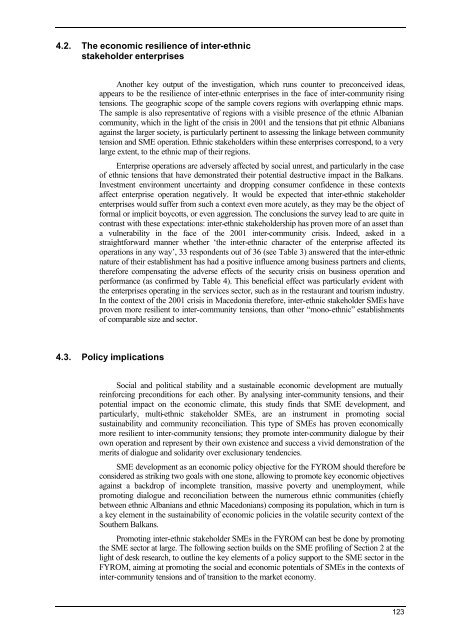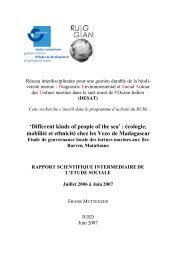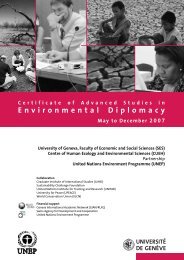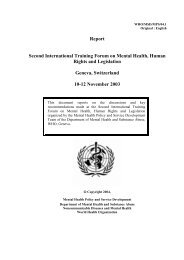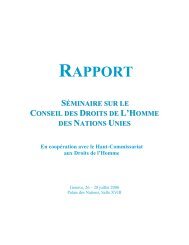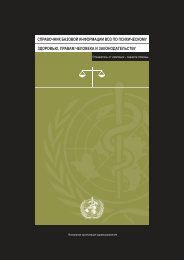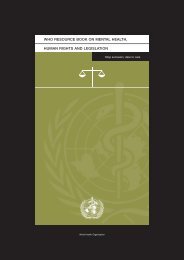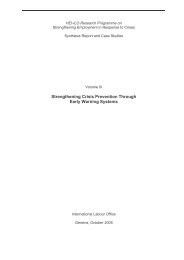Volume 1 Cedric - revised luca Final - RUIG-GIAN
Volume 1 Cedric - revised luca Final - RUIG-GIAN
Volume 1 Cedric - revised luca Final - RUIG-GIAN
You also want an ePaper? Increase the reach of your titles
YUMPU automatically turns print PDFs into web optimized ePapers that Google loves.
4.2. The economic resilience of inter-ethnicstakeholder enterprisesAnother key output of the investigation, which runs counter to preconceived ideas,appears to be the resilience of inter-ethnic enterprises in the face of inter-community risingtensions. The geographic scope of the sample covers regions with overlapping ethnic maps.The sample is also representative of regions with a visible presence of the ethnic Albaniancommunity, which in the light of the crisis in 2001 and the tensions that pit ethnic Albaniansagainst the larger society, is particularly pertinent to assessing the linkage between communitytension and SME operation. Ethnic stakeholders within these enterprises correspond, to a verylarge extent, to the ethnic map of their regions.Enterprise operations are adversely affected by social unrest, and particularly in the caseof ethnic tensions that have demonstrated their potential destructive impact in the Balkans.Investment environment uncertainty and dropping consumer confidence in these contextsaffect enterprise operation negatively. It would be expected that inter-ethnic stakeholderenterprises would suffer from such a context even more acutely, as they may be the object offormal or implicit boycotts, or even aggression. The conclusions the survey lead to are quite incontrast with these expectations: inter-ethnic stakeholdership has proven more of an asset thana vulnerability in the face of the 2001 inter-community crisis. Indeed, asked in astraightforward manner whether ‘the inter-ethnic character of the enterprise affected itsoperations in any way’, 33 respondents out of 36 (see Table 3) answered that the inter-ethnicnature of their establishment has had a positive influence among business partners and clients,therefore compensating the adverse effects of the security crisis on business operation andperformance (as confirmed by Table 4). This beneficial effect was particularly evident withthe enterprises operating in the services sector, such as in the restaurant and tourism industry.In the context of the 2001 crisis in Macedonia therefore, inter-ethnic stakeholder SMEs haveproven more resilient to inter-community tensions, than other “mono-ethnic” establishmentsof comparable size and sector.4.3. Policy implicationsSocial and political stability and a sustainable economic development are mutuallyreinforcing preconditions for each other. By analysing inter-community tensions, and theirpotential impact on the economic climate, this study finds that SME development, andparticularly, multi-ethnic stakeholder SMEs, are an instrument in promoting socialsustainability and community reconciliation. This type of SMEs has proven economicallymore resilient to inter-community tensions; they promote inter-community dialogue by theirown operation and represent by their own existence and success a vivid demonstration of themerits of dialogue and solidarity over exclusionary tendencies.SME development as an economic policy objective for the FYROM should therefore beconsidered as striking two goals with one stone, allowing to promote key economic objectivesagainst a backdrop of incomplete transition, massive poverty and unemployment, whilepromoting dialogue and reconciliation between the numerous ethnic communities (chieflybetween ethnic Albanians and ethnic Macedonians) composing its population, which in turn isa key element in the sustainability of economic policies in the volatile security context of theSouthern Balkans.Promoting inter-ethnic stakeholder SMEs in the FYROM can best be done by promotingthe SME sector at large. The following section builds on the SME profiling of Section 2 at thelight of desk research, to outline the key elements of a policy support to the SME sector in theFYROM, aiming at promoting the social and economic potentials of SMEs in the contexts ofinter-community tensions and of transition to the market economy.123


